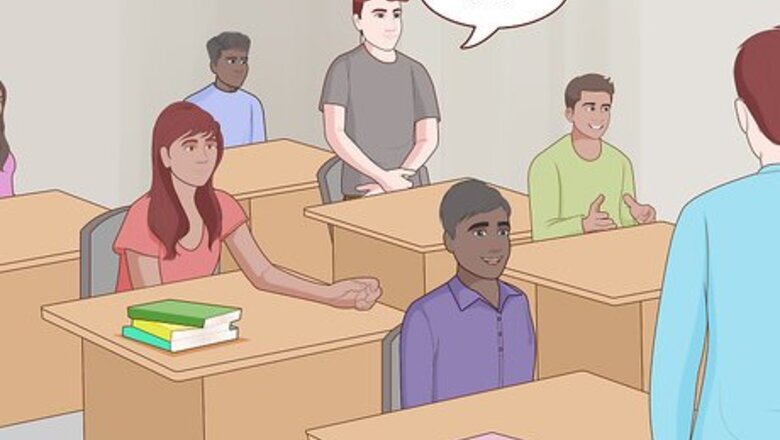
views
Showing Enthusiasm About Your Work

Ask meaningful questions in class. Asking questions shows that you're paying attention to what the teacher is saying. It also shows that you’re really engaged in what you're learning. Some people fear that asking questions will make people think they’re not smart. Actually, asking questions is a great indicator of intelligence and a desire to learn. If you’re going to ask questions, you need to pay attention. For example, if you ask, “When is that assignment due?” and your teacher has already said the due date once, they will think you’re not listening. Be mindful not to ask so many questions that you derail the class and prevent the teacher from finishing the lesson.
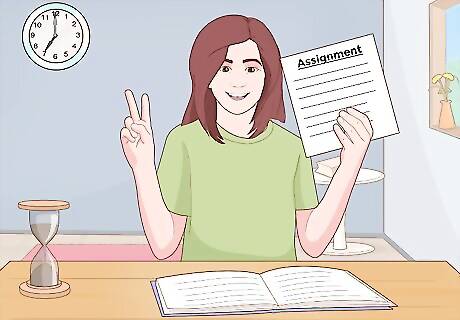
Complete all assignments on time. This one can be difficult if you have a lot of work, or if you tend to procrastinate. However, turning in assignments on time shows your teacher that you are prioritizing their class. Paying attention can also help you get good grades and many of your teachers will like you. Teachers have busy lives and need time off, just like you. They may have planned to grade all of your class’ papers on Wednesday night. If you turn your paper in on Friday, they will likely be frustrated that they now have to grade your paper over the weekend. If you know that you won’t be able to meet a deadline, talk to your teacher about it in advance. They may be able to grant you an extension.

Make extra efforts in your work. It’s always good to do more than the bare minimum for an assignment. Extra efforts can include binding your paper in a nice way to make it more presentable, or doing extra research for an assignment. If a teacher asks for a paper to be a certain length, you can aim to write something a little bit longer than requested, but not much. This shows that you weren’t just stretching to meet the minimum. If you make your paper too long, your teacher may think you’re sucking up or they may not like having to do that much extra reading.

Ask for extra help if you need it. Asking for help shows your teacher that you want to succeed. Many teachers look for this quality in a student, because if you want to succeed you’re likely to take their help and suggestions seriously. Don’t be afraid to approach your teacher during their free period or at the end of the day. You may need help understanding the subject matter, or knowing how to complete the assignment. You should feel comfortable asking for whatever kind of help you need. Asking help from your parents is a good option, too. They can explain things in another perspective, and will most likely love to help you. EXPERT TIP Alicia Oglesby Alicia Oglesby Professional School Counselor Alicia Oglesby is a Professional School Counselor and the Director of School and College Counseling at Bishop McNamara High School outside of Washington DC. With over ten years of experience in counseling, Alicia specializes in academic advising, social-emotional skills, and career counseling. Alicia holds a BS in Psychology from Howard University and a Master’s in Clinical Counseling and Applied Psychology from Chestnut Hill College. She also studied Race and Mental Health at Virginia Tech. Alicia holds Professional School Counseling Certifications in both Washington DC and Pennsylvania. She has created a college counseling program in its entirety and developed five programs focused on application workshops, parent information workshops, essay writing collaborative, peer-reviewed application activities, and financial aid literacy events. Alicia Oglesby Alicia Oglesby Professional School Counselor Push yourself to participate in class. It’s understandably hard for shy students to speak up in class, but try and find ways to boost your participation. Let your teacher know privately if you're struggling to speak up in class. You can also wait to ask questions one-on-one after class.

Respect the teacher’s authority on a subject. Teachers have been through a lot of education and they have chosen a profession where they get to share their knowledge. You may know a lot about a subject as well, but teachers will appreciate if you treat them as the experts they are. Occasionally it’s okay to correct your teacher. After all, everyone makes mistakes sometimes. Many teachers are wary of “know-it-all” students. Not only will acting like a know-it-all jeopardize your relationship with your teacher, it may also annoy your classmates. No one wants a smarty-pants as a friend.
Being Yourself

Let your teacher know who you are. Teachers can tell when a student isn’t being themselves. For example, if you’re a science fiction geek or a competitive athlete, those are important things that help define who you are. Never try to hide those things just to look like the perfect student. If you’re naturally a goofball or “class clown,” you may need to control yourself some to avoid disrupting class. However, most teachers have a sense of humor and will appreciate some silliness or joking in class. Don’t let your personality distract from class. For example, if you’re a social butterfly, you can wait until the bell rings to hand out the invitations to your party. You don’t need to do that during class.

Embrace things you and your teacher may have in common. This may be the only proven thing that determines which students will become a teacher’s favorite. You may remind them of themselves at your age, or of someone, they are close to. You may share interests or hobbies. If your teacher senses that you have something in common, they are likely to favor you. Sometimes, your teacher might just feel that you have similar personalities. For example, they might be able to identify with the fact that you’re shy, or that you get easily frustrated. If you know your teacher shares an interest with you, you can connect with them over that. For example, if your teacher loves art, you could bring in a review of the latest exhibition at the local art museum to share with them.

Be honest about your struggles. This can be difficult, especially if you’re shy. However, most teachers will appreciate a student who can be honest and confide in them. If you’re struggling with school work or having trouble at home, letting your teacher know will likely endear you to them. If you’re having trouble outside of school (such as at home or at a job) let your teacher know. They might be able to extend deadlines for you or help you talk to a guidance counselor. Be careful not to come across as whiny or complaining. Teachers can tell the difference between a student who is truly struggling and one who simply doesn’t want to do the work.
Treating Your Teacher Like a Person
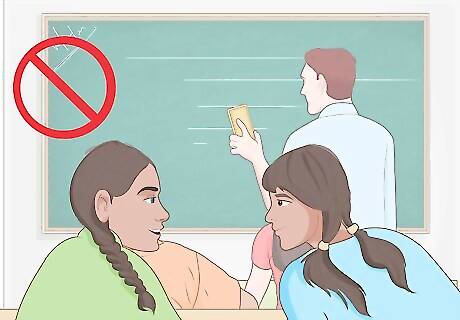
Remember that your teacher has a life outside of school, too. Teachers like to relax and have fun on the weekends just like you. Sometimes it might seem like they only exist to make your life miserable, but remember that they probably became a teacher because they like working with young people and love helping them learn. Show interest in your teacher’s life. You can ask them how their weekend was, or what they have planned for summer vacation. Don't talk behind a teacher's back. They will probably find out after a while. Gossiping about the teacher will get you in bigger trouble.

Smile and act friendly. Imagine if you came into work and everyone around you had a bad attitude. That’s what it can feel like for a teacher with a room full of grumpy students. Acting friendly and being happy to see your teacher will brighten their day and help them feel appreciated by you. A teacher can tell when a student is genuinely being friendly or just sucking up. Don’t go too far and start acting fake. Just a simple "Good morning!" or "Good evening!" is all it takes to brighten a teacher's day.

Accept the grades you’re given. You and your teacher might disagree about the grade you deserve in a class. However, your teacher has probably given your grade a lot of consideration. If you contest the grade your teacher gave you, they’ll think you care more about your grades than about the learning process. They also may feel that you’re disrespecting their authority. If you’re concerned that your grades are not what you wanted them to be, talk to your teacher about how you can get better grades next time.
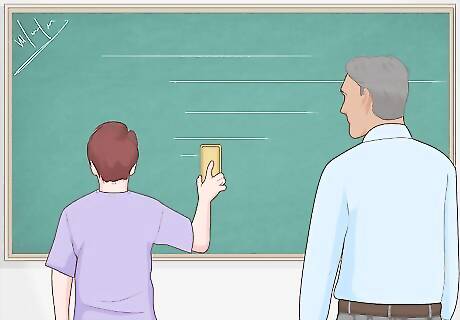
Be helpful to your teacher. Teaching can be difficult, and teachers get tired, just like you. If you notice that your teacher could use a hand, offer to help out. They’ll definitely notice and appreciate your helpful attitude. You can help your teacher by erasing the board, passing out papers, or bringing something to the office for them. If you arrive to class early, you can always ask if there’s anything you can do to help them prepare for class. You can also make a good impression if you tutor other students who might be struggling in the class.
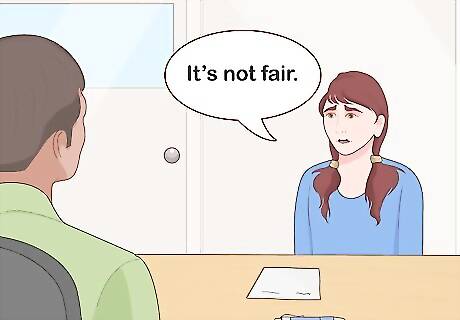
Talk to your teacher if you feel unfairly treated. If your teacher has not been treating you fairly, it’s okay to approach them about it. Ask them if you can speak with them during lunch or after school. Even if right now it seems that your teacher hates you, being able to have a mature conversation with them will likely turn the tide. Your teacher will see that you're invested in the relationship and in the class. Act calm and respectful when you speak to your teacher. You can say, “I’m not sure if you’ve noticed this, but I feel that I’m not being treated fairly in class.” It’s great to be able to give specific examples so your teacher can see what you’re talking about. You can say, “When Maria made a joke and the class laughed, you laughed too. But when I made a joke and everyone laughed you sent me to the office. I don’t feel like that’s fair.”




















Comments
0 comment